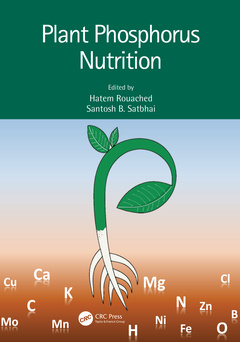Plant Phosphorus Nutrition
Coordonnateurs : Rouached Hatem, B. Satbhai Santosh

This book is an up-to-date reference on phosphorus nutrition in plants. Phosphorus has no substitute in food production, and the use of phosphate (Pi) fertilisers has increased crop yields to feed billions of people. This book covers phosphorus metabolism and phosphorus sensing molecular mechanisms and signalling in plants. It covers functions of phosphorus and crosstalk with other nutrients. It discusses how plants sense Pi deficiency and coordinate the responses via signalling pathways and networks for the regulation of Pi-deficiency responses.
FEATURES
- Discusses the latest developments in phosphate management in plants
- Provides insights on emerging topics for sustainable approaches to managing phosphate shortage
- Throws light on the resilience of plants to phosphate deficiency
- Provides extensive updates that serve as primary points for further research
- Explains molecular and physiological mechanisms of phosphate transport
This book compiles the latest research from experts in the field. It is useful for advanced graduates and researchers in plant sciences and agriculture.
1. Phosphorus Management for Agriculture and the Environment. 2. Molecular Mechanisms Underlying Phosphate Sensing and Signalling in Plants. 3. Phosphate Homeostasis and Root Development in Crop Plants. 4. Crosstalk between Phosphate and Other Nutrients. 5. Hormonal Control of Phosphate Uptake and Assimilation. 6. The Pivotal Role of Phosphate in Shaping Beneficial Plant-Microbe Interactions. 7. Phosphorus and Plant Immunity. 8. Biotechnological Approaches for Improving Phosphate Uptake and Assimilation in Plants. 9. Analysis and Comparison of Alphafold-Structure Predictions between Pi-Uptake Transporters Recovering Phosphate in Natural Environments. 10. A General Perspective of Phosphorus Research in Plants.
Hatem Rouached gained scientific and managerial skills during his PhD (University of Montpellier II, France, 2002–2005) and postdoc (University of Lausanne, Switzerland, 2005–2009), and as Senior Scientist in Crop Design (BASF Company, Ghent, Belgium, 2010–2012). In 2010, Hatem obtained the academic diploma for the ability to supervise PhD students (HDR University of Bourgogne, France). During his PhD and postdoctoral period, he acquired expertise in the areas of molecular and physiological aspects of plant nutrition. In particular, he studied the molecular mechanisms controlling the sulfate and phosphate transport and signalling in Arabidopsis through the study of the SULTR and PHO1 gene family. In 2012, he was recruited to INRA, Montpellier, France, as a permanent researcher. Since then, he developed an original research programme in the Biochemistry and Molecular Biology of Plants (B&PMP) Research Unit, aiming to decode the genetic and molecular basis of the interaction between the homeostasis of macro- and micronutrients, particularly phosphates and metals in plants. Hatem is currently furthering this research topic at Michigan State University, at the Plant Resilience Institute, East Lansing, Michigan, United States. He is also active in review and editorial services, and is an editor for Critical Reviews in Biotechnology, Scientific Reports, Frontiers in Plant Science, PLOS One, and the International Journal of Molecular Science. In addition, Hatem has organised several special issues in the plant mineral nutrition field.
Santosh B. Satbhai is currently working as an assistant professor in the Department of Biological Sciences, Indian Institute of Science Education and Research (IISER), Mohali, India. He earned his doctoral degree from Nagoya University, Japan. He has published papers in several reputed international journals such as Nature Genetics, Nature Communicati
Date de parution : 10-2023
17.8x25.4 cm
Thèmes de Plant Phosphorus Nutrition :
Mots-clés :
Plant; Phosphorus Nutrition; food production; phosphorus metabolism; phosphorus sensing molecular mechanisms; phosphate (Pi) fertilizers; Pi Deficiency; Low Pi Conditions; Auxin Receptor TIR1; IPS1; Pi Transporters; Pi Deficient Conditions; Pi Uptake; Pi Starvation; Pi Translocation; Phosphate Transporter; PHTs; Root Hair Elongation; Pi Accumulation; High Affinity Pi Transporter; Pi Deprivation; Pi Acquisition; Low Pi; Pi Homeostasis; Root Traits; Acid Phosphatase; Hairy Roots; APase Activity; PSR; RSA; Total Root Length



